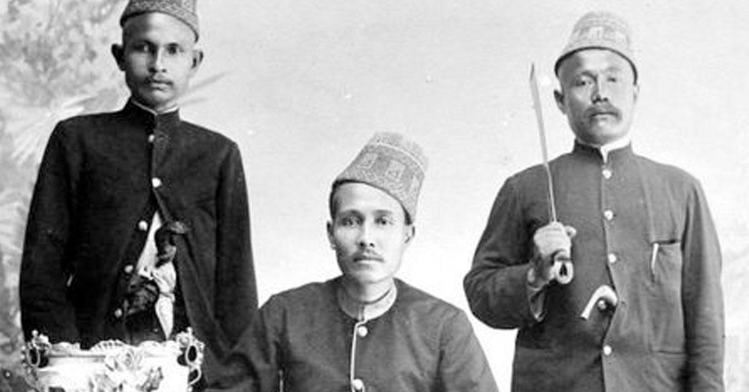
Muhammad Daud Syah, the last Aceh sultan, with his bodyguard. (wikipedia)
The king who ruled the people fairly was the same as the person who went to Hajj to Mecca sixty times. A just king will also receive rewards from God as much as one who prays a thousand times.
That's how the Taj us-Salatin Book lured the sultans in the past to become good leaders. From 24 chapters, nine chapters contain guidelines for being king.
Historian Lombard Danys explains Taj us-Salatin means Crown of Kings. The author calls himself Bokhari ul-Jauhari. His name can be translated to "Bokhari the goldsmith" or "Bokhari from Johor."
"Made in 1012 H (1603/4 AD), Taj al-Salatin was an offering to King Sultan Alaudin Riayat Syah," Lombard wrote in the Kingdom of Aceh.
The book views political power as an indispensable part of religion. Especially related to the task of the leader as a community regulator. Even parallel with the prophetic task, which is guiding humans to the right path. The terms are really not easy.
"Both of these tasks must be in the king's political authority. Both are described as 'two gems in a ring'," said Jajat Burhanudin, history lecturer at Syarif Hidayatullah Islamic State University.
In his book, Islam in the Flow of Indonesian History, Jajat explained that Taj us-Salatin contained the criteria of the kings. They must be qualified to carry out political and prophetic duties.
Adil and Ihsan
Included in the qualification if the king is able to be fair. Described in the book, fair comes from Arabic, which is honest. This refers to the moral condition and perfection of religion, where truth arises, both in the words and actions of the king.
That trait must then come with ihsan (kindness). "Fair is defined as the best thing for kings, so that a king who does not have both of these conditions (fair and ihsan) cannot be recognized as a true king," explained Jajat.
Taj us-Salatin then also classified the fair concept into several qualities that the king must possess. The king is fair, said the text, who always wants to study the ulamas. He also must pay attention to the social conditions of his people. Also always advocating goodness and forbidding evil.
The just king must also protect his people from every crime. He was also required to look like the prophets and guardians in their duties.
"The king must also know his people based on ratio (reason), so as to be able to distinguish between good and bad, between happiness and danger, and between fair and unfair," he continued.
Also emphasized in the work, the king at least knew the knowledge of death and hunch. With this knowledge, the king will be able to understand precisely the basic character of humans. Especially for people who will be appointed as official palace officials.
According to Jajat, the importance of the fair concept is not only the ideal formulation of the king. The concept of fairness also shows the existence of the kingdom and the source of royal social stability.
"Fair is put in the opposite direction to wrongdoing or tyrannical situations," he explained.
That is, if the concept of fairness is used as the ideal criteria of the king, wrongdoing is a criterion for an unjust king. The fair concept is a guarantee for the existence of a stable kingdom. While wrongdoing is a major factor for chaos and destruction.
Witjaksana
Although associated with an Arabic term, said Jajat, this concept is in accordance with the political culture of the archipelago. Even with different terms, the fair spirit can be found in the Javanese tradition: witjaksana or management.
"As fair, the understanding of wisdom also shows perfection in a king who rules the kingdom," he said.
The concept of wisdom was well established in the archipelago in the 17th and 18th centuries. It was defined as a capacity that was highly respected and rare. It does not only grant the owner with a very broad level of knowledge. However, also a deep awareness of reality and sensitivity to justice.
As well as fair, witjaksana is a Javanese political concept to show an ideal king who has the ability to weigh profit and loss in a complex decision. Not only that, this concept also means sharp sensitivity in making decisions to control the situation, especially in maintaining the cosmic order.
Taj us-Salatin also made Sufi teachings to formulate moral advice for kings. The text asks the king and his officials to always remember the doomsday of life where the dignity and prosperity they have will disappear.
Lombard thought the work was most likely very well known in the archipelago. The manuscript is found in large quantities. Especially in the 19th century the script adaptation was also read in the Yogyakarta and Surakarta Palace.
Not only that, during the time of Thomas Stamford Raffles occupied Singapore, the sultan there ruled with reference to Taj us-Salatin.
Secretary of Raffles, Abdullah Munsyi, also used it when he would know the character of the British lieutenant governor. Munsyi did it by being guided by the principle of hunch science he discovered at Taj us-Salatin.
"Taj us-Salatin is a text about mirrors for kings in the archipelago. The formulation of moral advice for the king's political attitude becomes the main substance of the text," Jajat said.
Read the Indonesian version here
karya yang sangat luar biasa,mengisahkan tentang perjuangan para pahlawan tempo dulu,@taministy